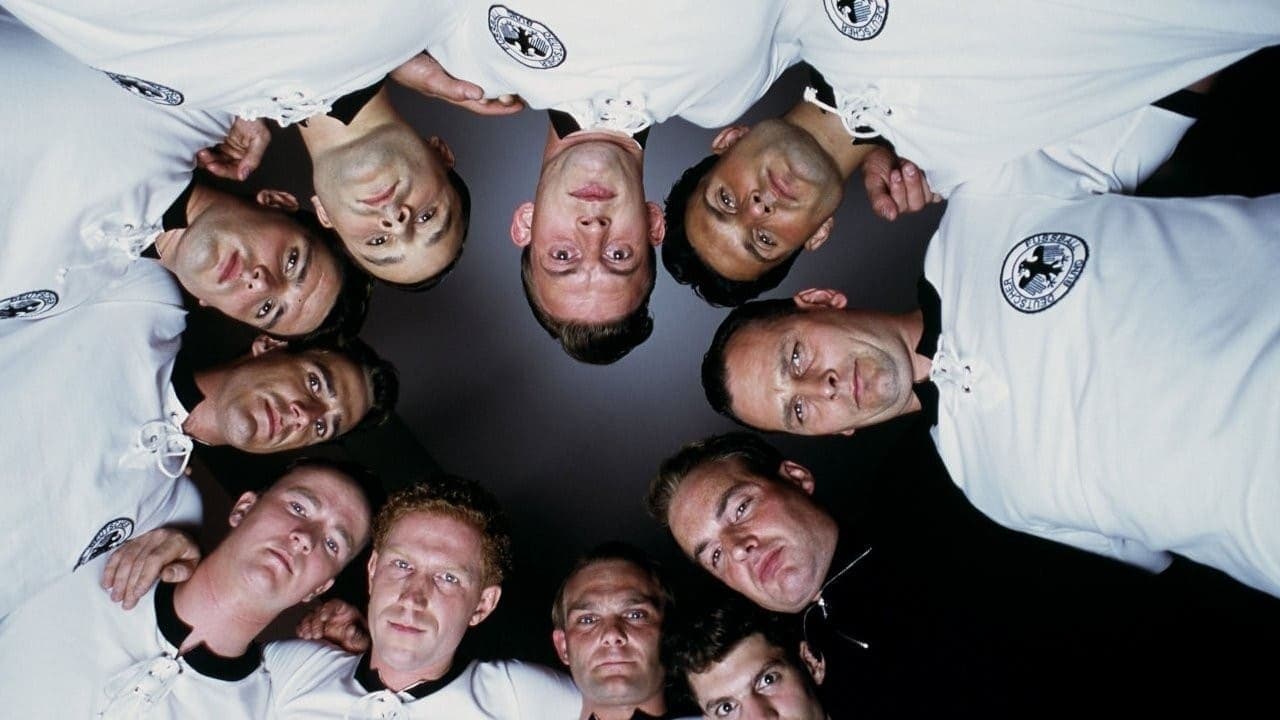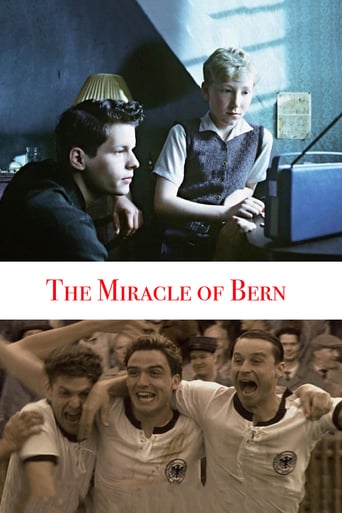



What makes it different from others?
Each character in this movie — down to the smallest one — is an individual rather than a type, prone to spontaneous changes of mood and sometimes amusing outbursts of pettiness or ill humor.
View MoreBlistering performances.
One of the film's great tricks is that, for a time, you think it will go down a rabbit hole of unrealistic glorification.
View MoreThe film is very disappointing don't go and watch it not action scenes the is strange because he killed bunny eat the music is good the film is not fun don't waste your money
View MoreThis could have been a nice movie about post-WW-II West Germany. Instead, it is just a pile of the cheapest, corniest movie clichés around.The story is preposterous. In short: little boy is the good luck charm of a German soccer player. The boy's father, jaundiced from doing time as POW in Russia, bullies the family after his homecoming. However, after just a chit-chat with the local priest, he opens up, the family members find together again, and grumpy dad turns into Mr. Nice overnight. So he borrows the priest's car and he and his son make it just in time to Switzerland to the final match of the 1954's world soccer championship. Naturally, the player spots the boy and wins the championship with the German team.As if this had not been kitsch enough, the sub-plots stink as well. You have the older son who is so rebellious that he joins the communist party in East Berlin - at a time when fugitives from East Germany flooded West Germany. You have the newspaper reporter who just happens to be at the hotel bar when members of the German team (who ignored the curfew) get drunk, the Swiss cleaning woman who lectures the German team's coach - and so on.The dialogs match the corny story - no father in the 1950's would have told his son "to find his style". Most lines are stiff and would have never been said at the time where the story is set.Speaking of sets: Yes, the Ruhr area was in rubble - but Wortmann makes it look like the village from "Monty Python and the holy grail". The newspaper's office looks more like Göring's Ministry of Aviation, the Bern "stadium" looks as fake as it is.In short: "The Bern Miracle" isn't miraculous at all.
View MoreIt is largely misleading to think of "Das Wunder von Bern" as a film about football history. Although the film is set in 1954, during the World Cup in Switzerland, there is essentially no World Cup football shown until the last half an hour, which features the final game of the tournament. The film is really about life in Germany in the early 1950s and the resurrection of the country from the ashes of the Second World War. The world title of the German team, totally unexpected for the World Cup first-timers before the championship, serves as a metaphor for this resurrection, and the fact is that it did spurt a resurgence of national pride and determination. Yet most of the football in the film is played by kids with rag balls, in the muddy back streets of the Ruhr region. A middle class German family living in this area is the encapsulation of German joys, trials and tribulations from the period working day and night to make ends meet, welcoming back the surviving prisoners of war, struggling to readjust them in society, the clashes between former Nazi soldier fathers and their "new-born" communist sons, the East-West Germany divide, the advent of television, rock'n'roll dancing balls (or was that just a few months ahead of time?), and of course football as the game of the working and middle classes. In my view, all this is introduced naturally and in good taste, without unneeded pathos, exaggerated martyrdom or heroism one thing that sets it apart from the typical Hollywood production. The acting is anything but flashy, but so was life there and then. I would say that the cast manages to hit just the right tone and the performances of Louis Klamroth and Peter Lohmeyer as father and son Lubanski are remarkable. Another difference between this film and a major studio blockbuster is that when it does come to football, the realism is uncompromising. The casting team spent some time on choosing actors who resemble the actual players as nearly as possible (the similarity in appearance and manner between Péter Franke and coach Sepp Herberger is almost uncanny). Moreover, these people know how to pass the ball, so that the need for special effects and stand-ins is minimal (also the exact opposite of Hollywood standards). The recreation of the final game itself is pedantic to the smallest detail, with not only the goals, but even trivial situations in midfield and radio commentary being reproduced with startling faithfulness. OK, the filmmakers forget to mention that Hungary had a goal disallowed for offside in the last minute, but apparently this decision was never in doubt. In the final scene of the film the hyped-up statements about how this sporting exploit launched a whole nation in the orbit of greatness that we have come to expect from Hollywood, are nowhere to be seen; they are replaced by a matter-of-fact reminder of the ephemeral nature of sporting successes. But don't get me wrong, this is a good (and not just a "feel-good") film on its own merits, not just because it's a Hollywood antidote.
View MoreAs a football fan, this movie appeals to me indeed. It is true-to-history, honestly depicted, filled with genuine and sophisticated acting performances and based on a historical background. The entire plot centers around the boy, Matthias, and tells the story of the 1954 World Cup through his eyes mainly. He makes this movie special and revives the era of the 50s in Germany, a time when this nation was just recovering from the devastation and the scars of WWII. The story is solid and very sincere. The acting is wonderful and the depiction of the contemporary setting is superbly staged. I can just recommend this movie to all football fans and anyone who enjoys pervasive stories that provide first class entertainment.
View More